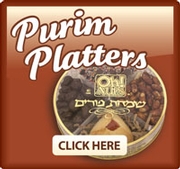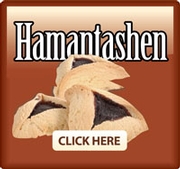Oh! Nuts ◊ Purim Baskets (Mishloach Manot), Gifts & Themes
Purim Baskets (Mishloach Manot), Gifts & Themes
Shalach Manos is a traditional gift that one sends to another on Purim day. It's an Oh! Nuts tradition to bring you the most up-to-date designed Shalach Monos and Purim Gifts Basket (Mishloach Manot) at the most reasonable prices. This Purim 2011 we made that extra effort that all of our Purim Baskets should be packed with only the highest quality Kosher candy, nuts and chocolate. Purim 5771 falls on Saturday evening (Motzei Shabbos), March 20th.
|
|
|
|
||||||||
 | |||||||||||
|
|
|
|||||||||
We at Oh! Nuts have put together a beautiful selection of Kosher for Passover Food. Starting with our nice large selection of Passover Gift Baskets, on to the complete selection of Passover Nuts and also our sweet selection of Passover Candy and Passover Chocolate and you can also get all your Passover Cake and Cookies.
Why do we give food gifts and charity on Purim, Purim gift baskets (Shalach Manos) of sweets, snacks and other foodstuffs given as mishloach manot (purim baskets)on Purim day?
In The Book of Esther it says "the sending of portions one man to another, and gifts to the poor" (9:22). Over time, this has become one of the strongest and most prominent features of celebrating Purim. According to Jewish law, every Jew over the age of 13 has to send two different, ready-made foods to one friend and two donations (either money or food) to two needy people, in order to fulfill the two mitzvot.
The gifts (purim baskets) that we send one to the other are called Mishloach Manot (sending of portions). These gifts will often include Kosher wine and pastries, sweets, chocolate, nuts, candy and/or other type of food stuff.
Some Synagogues or Jewish schools often run a collective Mishloach Manot (purim baskets) Fundraiser that manages the sending of Purim baskets to all members as Purim gifts. These projects are typically one of the best annual fundraisers for many synagogues and schools.
Although the sending of Purim Gift Baskets is technically required to one gift, (containing 2 items) for one friend, for many the custom has evolved into a major Purim gift-giving event. Families often prepare dozens of homemade and store-bought food baskets to deliver to friends, neighbors, and relatives on Purim day.
Impressive Purim gift baskets are also delivered to children's teachers, school principals, parents, bosses, doctors, and business associates with whom they have regular dealings throughout the year. This is voluntary due to the fact that the verse in the Megillah only mentions the sending of portions one man to 'another', which indicates one gift consisting of 2 items to only one man.
The verse clearly mentions as well 'gifts to the poor', which has been interpreted by Jewish law as requiring giving gifts to more than one person. This difference is to point out the importance of giving charity.
Historically, the custom of giving shaloach manos stems from when people would be going to one another's meal on Purim day, they brought along two ready-made types of foods. Being that the person at whose house they were eating, often did not have enough food they thus fulfilled their own obligation of Shaloach Manot.
There is a misconception that the mishloach manos has to contain two different items of food that each requires a different blessing to be said over it. In reality, the two foods are good even if they both require the same blessing.
In synagogues, collections of charity is customary and the money is distributed among the needy. No distinction was to be made among the poor; anyone who was willing to accept charity was allowed to participate. It is obligatory upon the poorest Jew, even one who is himself dependent on charity to give to other poor people.








 or
or 
